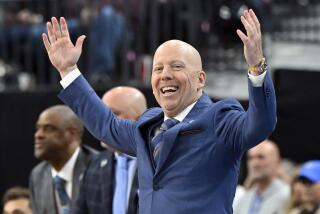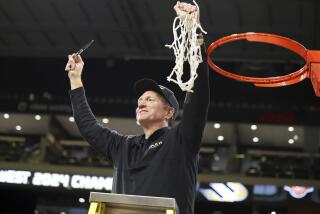Four coaches, two sides of the coin in the Final Four
No one planned for the opposite sides of this year’s Final Four bracket to turn out to be allegory for good versus upheaval.
No one fathomed it.
Only two out of 5.9 million entrants in ESPN’s NCAA tournament contest picked Connecticut, Kentucky, Butler and Virginia Commonwealth to reach the Final Four.
Look, though, at these slips plucked from a hat — one black, one white.
Jim Calhoun and John Calipari, the respective coaches of Connecticut and Kentucky, represent blue-state, bluegrass and blue-blood aristocracy.
Brad Stevens of Butler and VCU’s Shaka Smart, by comparison, are the “Hardly Boys.”
Stevens (34) and Smart (33) don’t even add up to one Calhoun, who turns 69 in May.
Calhoun has socks older than Stevens, and Calipari had two Final Four appearances vacated before Smart reached his first.
So, without further ado, let’s get right to the fanatical fringes.
Connecticut and Kentucky, which meet in one Saturday semifinal, are evil incarnate, corporate basketball factories led by ruthless dictators who will do almost anything to win. The programs have combined for nine NCAA titles but also have histories of problems with NCAA compliance.
Butler and VCU are as cute as pet-store puppies.
Kentucky’s past is rife with pride, prejudice and a points-shaving scandal — but it just keeps moving on.
Kentucky had no problem hiring Calipari on the heels of his 2008 Memphis team’s having to vacate its Final Four appearance when the NCAA invalidated Derrick Rose’s entrance exam.
Memphis presumably would have become the first NCAA team stripped of a national title had Calipari’s team not blown a late lead and lost in overtime to Kansas.
Stevens started at Butler in 2000 as a volunteer team manager.
In 1996, Calipari led Massachusetts to the Final Four, an appearance the NCAA later ordered vacated for improprieties tied to star center Marcus Camby.
Calipari was never directly implicated in either scandal, which Kentucky took as a green light to hire.
Smart, finishing his second year at VCU, attended tiny Kenyon (Ohio) College after turning down offers from Harvard, Yale and Brown.
He graduated magna cum laude.
Calhoun and Calipari are calloused, capable, calculated and brilliant pro producers. Sign with these guys if you want to play in the NBA.
Calhoun has coached Ray Allen, Rip Hamilton, Ben Gordon and Emeka Okafor.
Last year’s Kentucky team sent five first-round picks to the NBA, yet Calipari has taken this team on a deeper NCAA tournament run.
Connecticut would take exception to being Emery-packaged with Saturday’s opponent because it’s relatively new to systemic basketball success. Calhoun, finishing his 25th season, has been a rock of stability. Before that, the Boston-area native spent 14 years at Northeastern.
Kentucky was Kentucky before Calipari arrived, whereas Calhoun is UConn men’s basketball.
Connecticut didn’t get to its first Final Four until 1999, the year after Kentucky appeared in its 13th.
Calhoun’s 1999 and 2004 teams won titles.
He’s a scrapper and a battler, having overcome two battles with cancer. As a youth, he worked as a granite cutter and gravedigger.
You don’t spend 39 years in Division I without getting kicked around some.
“There’s no way you’re going to please everybody,” Calhoun said this week. “… And you’ll get nicks and dents and bumps.”
Calhoun got nicked in February when the NCAA suspended him for three Big East games next season for “failure to create an atmosphere of compliance” in a mini-scandal involving a former recruit and impermissible phone calls.
The sanctions clearly put a taint on his Hall of Fame career.
Calhoun wouldn’t want to be lumped in the Calipari bracket opposite the clean-cut kids. Calhoun and Calipari are not friends, their rivalry dating to Calipari’s days at UMass and the recruitment of Camby out of Hartford.
Calipari, 52, is also hardened, but much more the mercenary type. He cashed his UMass success for an unpleasant NBA payday.
“Within a year and a half, I was fired in New Jersey,” Calipari noted this week.
Calipari got his second wind at Memphis, a mid-major he took to the brink of a national title, before landing a dream job at Kentucky.
He has learned, though, never to get comfortable.
“I don’t think you ever feel validation in this profession,” he said. “Because this is kind of like golf — you think you’ve got it figured out, you get humbled real quick.”
Calhoun and Calipari look across the bracket and see, maybe, the innocence of their youths.
Calhoun calls Butler’s Stevens “the epitome of what you want our profession to represent.”
Calipari said Stevens and Smart are “both better than I was at that stage.”
Calipari also said, “I’ve been in their shoes, and I know how hard it is.”
Butler and VCU get Saturday’s first game in Houston.
George Bernard Shaw said that “youth is wasted on the young,” but it hasn’t been here.
Stevens and Smart represent irrepressible possibilities. Both are former Division III players taking full Walter Mitty advantage of their longshot opportunities.
Stevens is an Indianapolis kid and basketball junkie who ditched a lucrative career at pharmaceutical giant Eli Lilly in 2000 for a pipe dream at Butler.
He worked up from a gofer to become head coach in 2007. Last year, he led Butler to a two-point title-game loss to Duke — what was so improbable about that?
That figured to be the end of it, with the Bulldogs losing star Gordon Hayward to the NBA. Yet this team, with the help of a couple of miracles, has found its way back to consecutive Final Fours.
And he’s still getting checked for ID.
“I was asked a couple of years ago if I was a player,” said Stevens, a graduate of DePauw. “That was flattering.”
Smart’s ascent at VCU has been equally you-have-got-to-be-kidding-me. He was raised by a single mother in Oregon, Wis. “Shaka” was the African name given to him by the father he hasn’t seen in years — sort of the “Boy Named Sue” treatment to make him tough.
“Doesn’t bother me,” he said of the names he has been called. “I’ve heard it all before.”
He shot through the assistant coaching ranks — Dayton, Akron, Clemson, Florida — and received his VCU chance when coach Anthony Grant left for Alabama.
Through it all, he said that “basketball coaching is not who I am, it’s just what I do.”
After VCU struggled through a tough month, Smart called his team together on March 1 and burned, in a trash can, the February calendar.
“Fortunately,” Smart said, “nothing burnt down.”
Meanwhile, Calhoun said this week: “What I’m sometimes painted and perceived as, clearly I don’t recognize that person.”
Thirty years from now, will a 63-year-old Shaka Smart be saying this?
The great news for spectators is that Calhoun or Calipari, on Monday night, will face a scrub-face, Stevens or Smart, for the national title.
Youth will be served — or served up.
More to Read
Go beyond the scoreboard
Get the latest on L.A.'s teams in the daily Sports Report newsletter.
You may occasionally receive promotional content from the Los Angeles Times.











